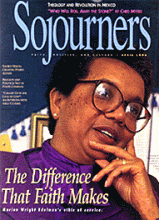The Catholic diocese of Chiapas, Mexicoand especially its bishop, Samuel Ruíz Garcíareceived international attention during the indigenous uprising this January. Ruíz, who is also the founder of the Fray Bartolomé de Las Casas Center for Human Rights in Chiapas, spoke with Sojourners Rose Berger and Julie Polter in October 1993 when the bishop was in Washington, D.C., to receive the Institute for Policy Studies 1993 International Letelier-Moffitt Award for Human Rights. The Editors
Sojourners: In our own experience here with liberation theology, we have learned that ones understanding of the gospel is formed by what you see when you look out the window each morning. What do you see when you look out your window?
Bishop Ruíz: Questions about liberation theology sometimes worry me. How are you thinking about liberation theology? I dont care about liberation theology, I care about liberation! Sometimes this question is asked from the European point of view, which brings a certain stencil, already cut out, ready to be applied in every situation.
For us this is no good. What is important is how and what we do with poor people. What is important is our commitment as Christians in a certain situation. Later on comes the organization of all of this thinking. Liberation theology is the third step.
Sojourners: How has the legacy of Las Casas continued on in your work today and how has it changed? [Editors note: Fray Bartolomé de Las Casas was a 16th-century priest who struggled for the human rights of indigenous people in Mexico.]
Read the Full Article
